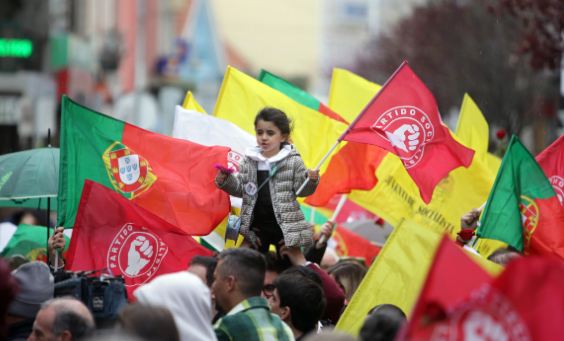Portugal votes with centre-right poised to oust Socialists

LISBON, MAR 10 (AFP/APP/DNA): Voters in Portugal went to the polls Sunday in an early election that could see the country join a shift to the right across Europe after eight years of Socialist rule.
Final opinion polls published Friday show the centre-right Democratic Alliance (AD) narrowly ahead of the Socialist Party (PS) but short of an outright majority in parliament, which could make the far-right party Chega a kingmaker for forming a governing coalition.
But analysts warned the results of the election, Portugal’s second in two years, remained wide open given the large number of undecided voters.
Voting stations in the nation of around 10 million people opened at 8:00 am (0800 GMT) with exit poll projections expected at 8:00 pm.
“These elections represent a possible change, there would be little point in doing otherwise,” Pedro Resende, a 56-year-old security officer, told AFP at a polling station in Telheiras, a modern upper middle class neighbourhood in northern Lisbon.
The AD has campaigned on promises to boost economic growth by cutting taxes, and to improve the country’s public services.
“We really must turn the page,” the party’s leader, 51-year-old lawyer Luis Montenegro told a packed final rally at Lisbon’s bullring on Friday night.
He has ruled out any post-election agreement with Chega, but other top AD officials have been more ambiguous.
Analysts say a deal with the anti-establishment party may prove the only way for the AD to govern.
– Far right gains –
Chega’s leader Andre Ventura, a former trainee priest who went on to become a television football commentator, has said his party is “as legitimate as the others”.
Chega, which means “Enough”, calls for tougher measures to fight corruption, stricter controls over immigration and chemical castration for some sex offenders.
Just five years old, Chega picked up its first seat in Portugal’s 230-seat parliament in 2019, becoming the first far-right party to win representation in the assembly since a military coup in 1974 toppled a decades-long right-wing dictatorship.
It increased its seats to 12 seats in 2022 and polls suggest it could more than double that number this time.
That would mirror gains by far-right parties across Europe, where they already govern — often in coalition — in countries such as Italy, Hungary and Slovakia, or are steadily gaining, as in France and Germany.
The election was called after Socialist Prime Minister Antonio Costa, 62, unexpectedly resigned in November following an influence-peddling probe that involved a search of his official residence and the arrest of his chief of staff.
Though Costa himself was not accused of any crime, he decided not to run again.
– ‘Time for a change’ –
On his watch unemployment has dropped, the economy expanded by 2.3 percent last year — one of the fastest rates in the eurozone — and public finances have improved.
But surveys indicate many voters feel Costa’s government squandered the outright majority it won in 2022 by failing to improve unreliable public health services and education or address a housing crisis that has sparked large street protests in what remains one of Western Europe’s poorest countries.
“From my point of view things have worsened a bit. It’s time for a change,” Bernardo Guerra, a 28-year-old personal trainer, told AFP after casting his ballot at a high school in central Lisbon.
“In Portugal there is a lot of corruption, Portugal has a bad image abroad… I hope a new government improves this situation.”
The Socialists’ new leader, 46-year-old former infrastructure minister Pedro Nuno Santos, has defended the government’s record even as he acknowledges it could have done better in some areas.
“The right thinks they’re going to win the election with their usual arrogance and lack of humility. It’s the Portuguese people who will decide,” he said at his final rally on Friday night.
Related News

UNESCO Proclaims May 5th as World Day of Portuguese Language and Lusophone Cultures
In 2009, fifteen years ago, the date of 5th of May was officially established byRead More

Paçacı appointed as Special envoy of SG-OIC on Islamophobia
As of 2022, he is serving as Turkey’s Ambassador to Pakistan DNA ANKARA: The TurkishRead More


Comments are Closed